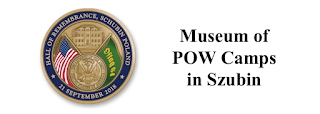We discussed escape opportunities and we were able to escape, 4 of us on the trip from 7B to 64. We jumped out of the train window at the last station before Poznan. Unfortunately, I was last out and became separated from the others. They were recaptured the next day, but I was out of for 3 more days before I was recaptured. I was able to get help from an elderly Pole who fed me, hide me and even used his sister to try a contact in Poznan the British had given to me. The contact was gone, so I was on my own. That evening I began walking to Gdynia.
After a futile attempt to steal a bicycle I walked til dawn. I passed though one small village and finally decided to hide in a barn in the hayloft. I was undiscovered in the barn and that night started walking again. I milked a cow for some delicious warm milk before I left the barn and within an hour I begin suffering from diarrhoea. It was a humiliating experience for several hours. Quite debilitating! I walked all night and someone had seen me, because I was recaptured by a man on horseback. He ran me down with his horse, injured my back and walked me back to the nearest village to the mayor’s house. A policeman arrived and took me to the jail. I thanked the mayor’s, gave him some cigarettes and chocolate for his 16 yr old daughter for his kindness for me. Unfortunately I don’t remember the name of the village. From there the Police captain took me to Szubin to Oflag 64.
When I walked through the town from the train station everybody was watching us. As I reached the camp everybody was lined up shouting and applauding as I was led to the guard house to a cell where other 3 were also jailed. Mixed emotions were rampant. It wasn’t until later that I learned that I should have tried to contact a priest when I had the opportunity. Many escapees were helped by the church all the way back to freedom.
Once in a jail at the camp I received food, books, visits and comfort with my friends Frank Aten, John Pearson and Bill Duckworth.
We were only a small group from 7B, 22 of us. But my arrival on June 6, 1943 was a surprise to me so many more that preceded us from other camps in Germany. This, evidently, was the only officer camp for ground forces POWs. We were all released from jail together in two weeks to a tumultuous welcome by the others and introduced to Col. Drake our Camp Commander. A full colonel and haughty, splendid looking man. He turned out to be a real leader and made life at least the best possible under conditions.
It doesn’t take long to accommodate oneself to camp life. Everything was so limited and orderly by the time we got out of jail that it was easy to fit in. Freedom felt so good!!!
***
By the way – the Germans were always searching for tunnels. I was the person who formed the tunnel plan that would have been unsuccessful under the pot in the washroom. All the dirt we removed was stored in the crawl space under the roof. We could only work at night. We had spotters watching the front gate at all times. One was in the bathroom, on the third floor of the main building. The second was in our barracks. The signal to suspend all activities was simply a lighted candle in the window.
***
Lou Otterbein was our main craftsman who made all of our theater props,
as well as, escape tools and aids. Everything was made of out tin cans
and scraps. He made the floodlight + reflectors out of tin cans, a
bellows to supply air in the tunnel, and the suction to remove water
from the sump in the tunnel. The tracks and the carts for the dirt
removal. Old shoe tops were used to make the bellows.
***
Dr. John Creech was later named chief of US National Arboretum in Washington, D.C. He was in charge of all of our vegetable gardens in Oflag 64. The son-in-law of General Patton was Col. John K. Waters. Amon Carter, in charge of our parcel hut was the son of the wealthiest man in Texas at that time. Tom Jones was the nephew of Jesse Jones – the chief of the manpower program of the U.S. for the war effort. As fact of history Amon Carters’ father flew to Europe to pick up his son when he was finally liberated, as well as, others from Texas who were more with Amon.
© Sidney Thal
Edited by Mariusz Winiecki
Special thanks for Cheryl Ellis, for corrections on her father's story.
© Sidney Thal
Edited by Mariusz Winiecki
Special thanks for Cheryl Ellis, for corrections on her father's story.









Brak komentarzy:
Prześlij komentarz